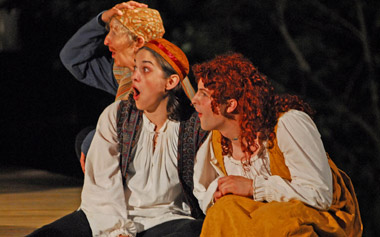The Hampshire Shakespeare Company is beset by problems this summer. The notorious misogyny of the season’s opening show, The Taming of the Shrew, creates a problem for any director. Shakespeare’s predominantly male dramatis personae present a perennial casting problem, especially for community theaters whose acting pools tend to be majority female. And the company’s move from its longtime summer home in Hadley to North Amherst has posed simultaneous challenges in logistics and marketing—most acutely, letting audiences know about the new digs.
Now in its third decade, the company has relocated, appropriately enough, to the leafy lawn of the Renaissance Center (officially, the Massachusetts Center for Interdisciplinary Renaissance Studies), a UMass adjunct housed in a period cottage that might have come from Shakespeare’s Warwickshire.
“What better organization to be connected to than the Renaissance Center?” muses John Bollard, chair of Hampshire Shakespeare’s board of directors. “I think it’s a great move, a mutual connection that should bring greater visibility to both of us.” The new partnership builds on existing connections, as the two organizations have increasingly shared resources over the years.
The visibility issue is one that occupies producer Sean Landers as the season gets underway. News of the move is taking some time to get out, since the company has spent more than a decade at the Hartsbrook School in Hadley. And the Renaissance Center, tucked into a far corner of the UMass campus, is itself “one of the best-kept secrets in the Valley.” Landers hopes Hampshire Shakespeare’s presence will bring wider awareness of the Center’s work, just as the new partnership will bring new audiences from Amherst and environs to the company’s shows.
And, he says, “As far as scenery goes, I think we’ve traded up.” The multi-level outdoor stage—an elegant open-plan design by Barry Magnani based on the company’s Hartsbrook stage—nestles against a shady grove of trees at the edge of a field that frames the sunset.
As for the twin problems posed by the summer’s first production, director Jack W. Zaryckyj has solved them both in a single stroke. He has cast the entire show with women in the male roles and vice versa, which corrects the company’s gender imbalance and puts the shrew-taming shoe on a feminine foot.
For a modern audience, The Taming of the Shrew is problematic because of its central notion that a strong-willed, sharp-tongued woman needs to be broken and domesticated. In the play, the male golddigger Petruchio comes “to wive it wealthily in Padua” and relishes the challenge of taming rich, recalcitrant Katharina. Casting Linda Tardiff as the dominant male and Sam Perry as the uppity shrew provides an implicit refutation of Shakespeare’s macho theme.
Working with a surprisingly young cast of varying experience, Zaryckyj delivers a fairly straightforward production that lets the gender-swapping anti-convention speak for itself. Shrew is a play-within-a-play, putting it a step removed from realism, so there’s no attempt at accurate male/female impersonation. That’s done simply with hairpieces and Sarah Pruitt’s costumes—gowns and wigs for the boys, breeches and chin whiskers for the girls.
The Taming of the Shrew: Wed.-Sun. through June 26, HSC season through July 31. Hampshire Shakespeare Company, Renaissance Center, 650 East Pleasant St., Amherst, www.hampshireshakespeare.org.



